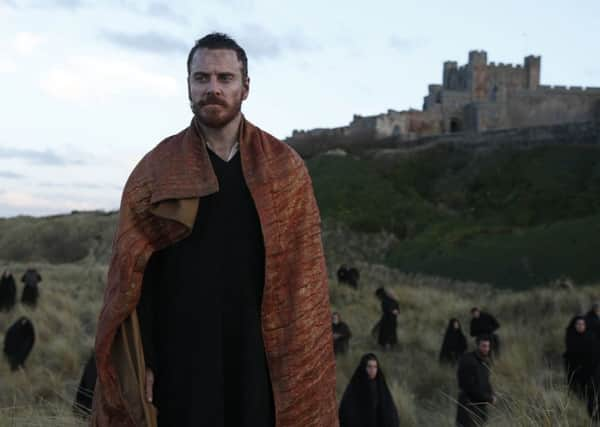Film review: Macbeth (15)


Macbeth
Directed by Justin Kurzel
Starring Michael Fassbender, Marion Cotillard, Paddy Considine, David Thewlis, Sean Harris
Star rating: ****
Shakespeare’s Scottish play gets a visceral update in this cinematic version from Australian director Justin Kurzel. The director of the bleak crime drama Snowtown has taken the text and opened it up, expanding this tale of vaulting ambition, regicide and madness by integrating it with the Scottish landscape (it was partially filmed on Skye) and teasing out the psychological nuances of its tragic protagonists. In this version, which retains the 11th-century setting but has a hellish and otherworldly quality too, Macbeth (Michael Fassbender) really is a fearsome warrior, already driven half-mad by the carnage of combat and the loss of his infant son.
Advertisement
Hide AdThe film begins with the funeral of the latter and, as we see Macbeth silently suffering, Lady Macbeth (Marion Cotillard) ashen-faced by his side, we get a sense that this loss is the catalyst for everything that follows. Theirs is not blind ambition, but ambition blinded by grief, something that makes them susceptible to the witches’ prophecy that plants the seed for Macbeth’s subsequent murderous reign. In a bold move, Kurzel intercuts this moment – which opens the play – with a slow-motion battle sequence that’s all mud, blood and crimson colour schemes. Macbeth spies the witches as if in a vision as he’s slicing the throats of his enemies – a nifty and oddly beautiful way of conflating the idea that the trauma of war is playing tricks on his mind.
It’s a hell of an opening and it also manages to solve one of the biggest hurdles of staging Macbeth: finding a credible way to convey the speed with which its tragic hero falls from grace. Shakespeare didn’t mess around in this respect and nor does Kurzel. The murder of King Duncan (David Thewlis); the fleeing of his son and heir Malcolm (Jack Reynor); the preemptive slaying of Banquo (Paddy Considine) – the film dispenses with it all swiftly and nimbly as Macbeth forges ahead, at the urging of his wife.
But if the film arrives on screen with sound and fury, the claustrophobic drama of the play comes to the fore in the way the characters interact with each other. Dialogue, for instance, is often whispered and mumbled. It’s simultaneously intimate and alienating, drawing you in with its implicit confessional tone but pushing you away with its unfamiliar rhythms and cadences (and more than a few wavering Scottish accents). The poetry is pugilistic rather than pretty, the big speeches declamatory not so much in their delivery but in their madness-enhancing effect. When Macbeth sees Banquo’s ghost at the feast to celebrate his ascension to the throne, it’s the feverish incomprehensibility of his words that signify his mental disintegration to the rest of the assembled guests. He’s certainly a man who looks like his mind is full of scorpions.
Fassbender throws himself into Macbeth’s psychological meltdown. The muscularity of his performance in its early stages – the brooding, virile warrior, battle-scarred and brokenhearted – giving way to a more mannered, tick-filled turn as the thane goes insane. But the film is big enough to ensure this still feels naturalistic – or at least naturalistic in the context of the stylized world Kurzel has created. His use of blood red and burnt orange cinematography creates a mood of ominous dread, one that reflects the contours of Macbeth’s ravaged mental state as he takes charge of a kingdom acquired through murder and frequently lit up by fire, be it the funeral pyres of his enemies or the blazing branches of Birnam Wood.
Cotillard’s performance, however, really elevates the film. Her Lady Macbeth is less scheming than past interpretations and she doesn’t play her as the conniving wife of popular imagination. Instead she plays the reality of a woman whose grief over the loss of her child has twisted her thoughts towards murder – her manipulation of Macbeth is more of a desperate, misguided attempt to fill the void in their lives, not a power-grab for the sake of it.
Cotillard has made a career out of playing anguished souls and she makes Lady Macbeth sympathetic in a way that’s surprising, moving and devoid of handwringing. The dawning realisation of just what she’s unleashed in her husband is delicately etched on her face as he executes Macduff’s family. And her own descent into madness is beautifully conveyed by Cotillard during Lady Macbeth’s most famous scene (“Out damned spot…”), which Kurzel shoots as a hallucinatory reverie that reinforces the pathos of her performance and intensifies the impact her subsequent absence from the rest of the story has on the film.
All in all this is bold and ambitious filmmaking, artful but accessible, and a worthy addition to the canon of great Shakespeare adaptations.